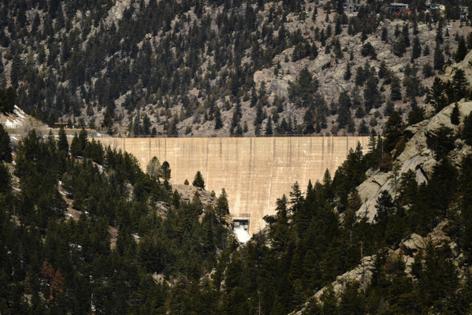Feds' approval of Gross Reservoir dam expansion violated environmental law, judge rules
Published in News & Features
Federal regulators violated environmental protection laws when they improperly issued permits allowing Denver Water to expand Gross Reservoir, a federal judge ruled this week.
The U.S. Army Corps of Engineers violated the Clean Water Act and the National Environmental Policy Act when approving permits for the construction of the dam, U.S. District Court Judge Christine Arguello found in the ruling, issued Wednesday. The federal agency failed to sufficiently consider other options besides dam expansion that would be less environmentally damaging, Arguello wrote in her order.
Arguello did not order Denver Water to stop construction on the dam, in part because the utility already planned to halt construction in November for the winter season. An abrupt halt to the project could also affect the integrity of the dam, she wrote.
The defendants and plaintiffs will now work to create a remedy for improperly issued permits.
The order Wednesday was the latest decision in a winding six-year legal fight over the controversial dam project. A coalition of environmental groups first filed suit in 2018 to stop the expansion of the reservoir, which they say would harm the health of the Colorado River — where the reservoir’s water is sourced.
Denver Water began construction on the dam in 2022. Already, workers have partially deconstructed the existing dam to prepare it for expansion, dumped fill material and poured concrete for the expansion.
When completed, the expanded dam will triple the reservoir’s capacity from 42,000 acre-feet to 120,000 acre-feet. An acre-foot of water can supply two Colorado families for a year, so the expanded reservoir will be able to store water for approximately 156,000 additional households.
The reservoir will be the second-largest in Denver Water’s storage portfolio. The utility provides water to 1.5 million people in the Denver metro — about a quarter of the state’s population.
Denver Water argued in its filings that the issues raised are now moot since construction has already begun and the permits in question already used.
Arguello, however, dismissed that argument, as the reservoir has not yet been expanded and the 400 acres and 500,000 trees it would drown still remain above water.
“To the extent Denver Water disagrees, it has only itself to blame — because Denver Water chose to proceed with construction despite the obvious risk posed by pending federal litigation that could lead to vacatur of the permits authorizing said construction,” Arguello wrote. “Denver Water cannot ‘evade judicial review’ or ‘defeat a judgment’ through its own ‘questionable behavior.’ ”
The environmental groups that filed the suit will now start discussing what legal remedies they will pursue, said Gary Wockner, director of Save the Colorado, one of the plaintiffs.
“This is a stunning victory for the Colorado River, the people of Boulder County and the rule of law,” Wockner said. “We look forward to engaging with Denver Water to reach a good-faith agreement about how to remedy the Corps’ non-compliance.”
_____
©2024 MediaNews Group, Inc. Visit at denverpost.com. Distributed by Tribune Content Agency, LLC.







Comments